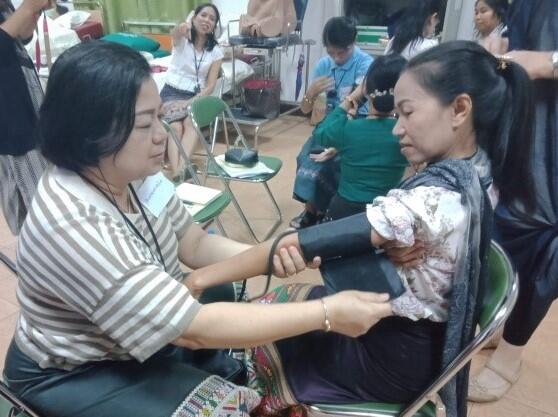
My name is Phonmala Manomath. I am 57 years old and I am from Huaxieng Village, Luang Prabang District, Luang Prabang Province in Lao PDR. I have been a midwife teacher for almost 30 years now, sharing knowledge with students and helping women and babies. You can’t imagine how much I love my job. I enjoy the contact it gives me with children. I adore them! I don’t have kids myself but I feel great satisfaction for each safe delivery.
I would say that I am balancing well my personal and professional life. I do not have a lot of responsibilities at home as I am single, so I dedicate more time to my passion for my job. Before COVID-19 came, we already had TB, HIV and we have been adopting preventive measures for these viruses for students. For COVID-19, we also had measured and trained our students. We were following the news and expansion of the epidemic in other countries and we knew we had to be prepared for that as well in LAOS. We quickly reacted to the urgent need to protect ourselves and inform pregnant women and our students to protect themselves.
 This epidemic brought lot of change to our working conditions and to our educational role as well. Not only are we responsible for our own safety but also for the safety of our patients so that they do not contract the virus and do not spread it, especially the protection of the most vulnerable ones like pregnant women.
This epidemic brought lot of change to our working conditions and to our educational role as well. Not only are we responsible for our own safety but also for the safety of our patients so that they do not contract the virus and do not spread it, especially the protection of the most vulnerable ones like pregnant women.
For example, in the past, if we wanted to go somewhere, we did not have to wear facemasks. But now, we have to wear them as well as carrying hand sanitizers, alcohol, etc. For patients, our duty is to explain to them step by step how to protect themselves. I would say that I am proud of the sense of responsibility many have, they feel concerned by COVID-19 and wear masks, wash hands. They follow the measures from information provided by health workers. I am very satisfied with their actions and reactivity.
I feel fortunate because colleagues, friends, and relatives around me often discuss and share with me the news on the ongoing situation whether in group chats or in person. At work, we are routinely updated by health office or health authorities and then we share with our colleagues' online group. The working climate is positive and we encourage each other during this situation.
In my job, many workers are women. We are five in my team, but during the epidemic we take turns so there will be only two women working to reduce risks. There is resilient solidarity between health workers I would say. Women advocate and encourage very well. They help each other. If there are not enough health workers, we also send our students to assist at the checkpoints and province border. Our college encourages students to help health workers. Of course, before we send them, they must practice training of protection and other measures. COVID-19 has been so far a symbol of mutual support to each other in our job, at all levels.
If I have to address words to the population, I would say: most important, protect yourselves, by easy ways including avoiding places that contain many people like markets if not necessary or going once a week, washing hands with soaps, hand sanitizers, or alcohol, maintaining nutrition by eating healthy food and vitamin C, and practicing slow deep breath every morning.
I wish also to address a message for pregnant women to ask them to avoid stress because stress can affect immunity to try to relax, listen to music, watch comedy movies, practice meditation, and do relaxing activities at home, avoiding close contact with big groups. As a midwife teacher, I am very fulfilled with the career that gave me the honor to help patients and teach students. They call me as a mother, can you imagine? and I am very happy to be their mother who guides them to their responsible futures. We are like a big family.
I hope students complete their responsibilities and enjoy their careers providing quality job, using what they have learned to strengthen their future experiences and provide care for patients with good hearts and value. Midwifery will be robust in the future. We have to be prepared because we do not know how COVID-19 will evaluate in the future.
There may be between 330,000 -368,000 unplanned pregnancies in Laos during 2020-21. This number is impacted by COVID 19. Midwives help deliver contraceptives and save women's lives through safe deliveries. The Ministry of Health is increasing the investments in the Lao Midwifery workforce with UNFPA support.
All images credit: UNFPA Lao PDR
UNFPA, the UN's sexual and reproductive health agency, works in Lao PDR and over 150 other countries globally to achieve zero maternal deaths, zero unmet need for family planning, and zero gender-based violence and other harmful practices against women and girls - a vision enshrined in the Programme of Action stemming from the landmark 1994 International Conference on Population and Development (ICPD).
To learn more about our response to COVID-19, visit www.unfpa.org/covid19
To support our lifesaving work amid the pandemic, visit https://donate.unfpa.org/th-en/covid-19


